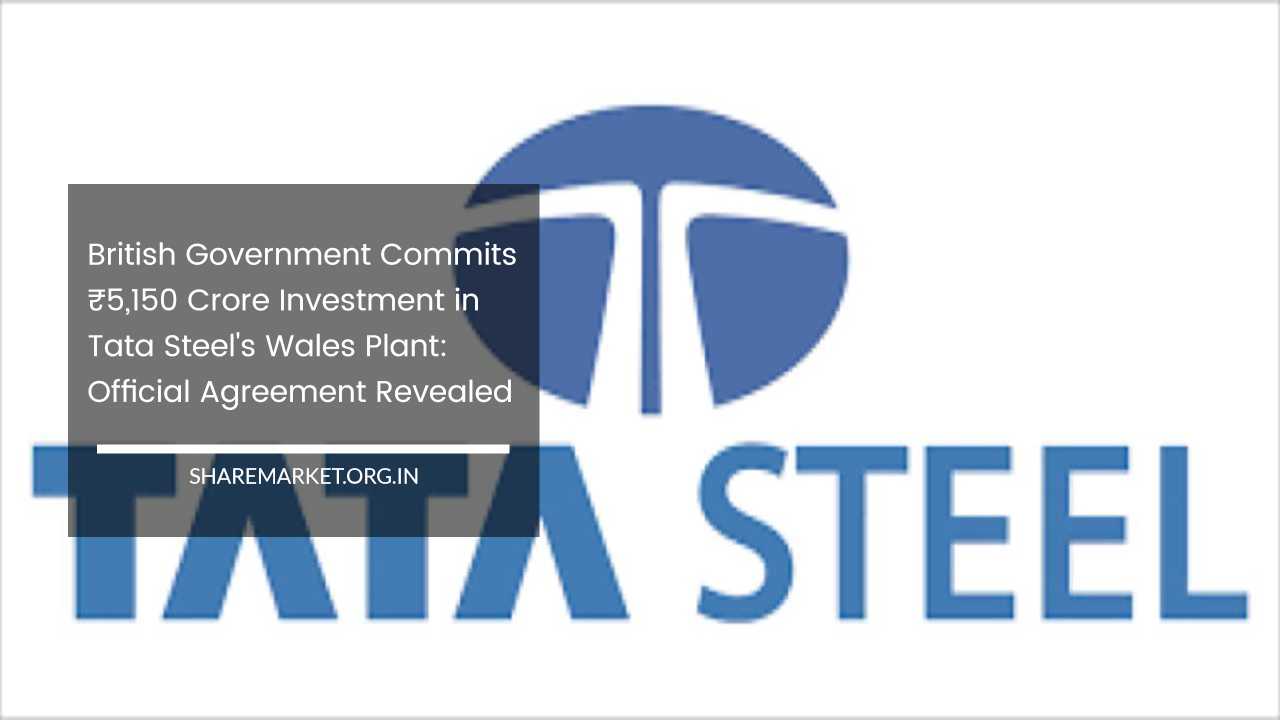British Government Commits ₹5,150 Crore Investment in Tata Steel’s Wales Plant: Official Agreement Revealed

Tata Steel
The British government’s recent commitment to provide a grant of £50 crore (equivalent to approximately Rs 5,150 crore) to Tata Steel marks a significant milestone in the efforts to combat carbon emissions at Tata Steel’s British plant.
The company officially communicated this development via stock exchange notifications on Friday, September 15th, unveiling the government’s substantial financial support.
This pivotal investment is aimed at addressing pressing environmental concerns while preserving employment opportunities in the Port Talbot town of South Wales, where Tata Steel’s plant is located.
The story of this agreement is emblematic of the larger global movement towards sustainable industrial practices and green technology adoption.
For several months, discussions had been underway between Tata Steel and the British government to rescue the Port Talbot project from impending closure.
The negotiations culminated in a historic agreement where Tata Steel and the British Government jointly committed to establishing a state-of-the-art electric arc furnace steel plant at the Port Talbot site.
The project’s estimated investment stands at a staggering £1.25 billion, inclusive of the government grant of £50 crore.
Notably, during the initial stages of the negotiations, Tata Steel had sought a more substantial financial infusion from the British government, reflecting the magnitude of the undertaking.
N Chandrasekaran, Chairman of the Tata Group, lauded the significance of this agreement, emphasizing its profound implications for the steel industry’s future and the broader industrial value chain in Britain.
He stated, “This agreement with the British Government is very important for the future of the steel industry as well as the industrial value chain of Britain.
This proposed investment will preserve thousands of jobs and present a great opportunity for the growth of a green technology-based industrial ecosystem in South Wales.”
Tata Steel emphasized that there are still outstanding steps to be taken in the project’s development. This includes the collection of all pertinent information and consultation processes that need to be completed.
Once these essential approvals and certificates are secured, the project can commence within a timeline of 36 months.
In financial markets, the impact of this development was palpable. Tata Steel’s shares experienced a modest yet positive shift, closing at Rs 132.20 on Friday, September 15th, with a gain of 0.38 percent.
This upward movement in the company’s shares is indicative of investor confidence in the future prospects of the project and its potential to bolster Tata Steel’s standing in the market.
Over the past month, Tata Steel’s shares have recorded a notable increase of 14.01 percent, further underscoring the positive sentiment surrounding this strategic agreement.
In the longer-term perspective, the company’s share price has surged by approximately 25.07 percent over the past year, reinforcing the enduring value of this investment.
This transformative agreement between Tata Steel and the British government is poised to redefine the steel industry’s landscape, not only in Britain but also on a global scale.
By integrating advanced technologies and sustainable practices, the project holds the promise of significantly reducing carbon emissions, fostering job retention, and propelling the growth of a green technology-driven industrial ecosystem in South Wales.
As the project progresses through the necessary phases, it will be closely monitored for its positive impact on both the economy and the environment, setting a remarkable example of public-private collaboration for a sustainable future.
The Environmental Imperative
The decision to provide a substantial grant to Tata Steel by the British government underscores the growing environmental imperative in industrial sectors worldwide.
Carbon emissions from industries, including steel production, have long been a significant contributor to global greenhouse gas emissions, driving climate change and environmental degradation.
The Port Talbot plant, like many others in the steel industry, faces the challenge of reducing its carbon footprint while maintaining production and employment levels.
Modernizing steel production processes with advanced technologies, such as electric arc furnaces, is a key strategy in this endeavor.
These technologies offer a more environmentally friendly alternative to traditional blast furnaces, which are energy-intensive and emit substantial amounts of carbon dioxide.
By investing in such green technology, the British government aligns itself with international efforts to combat climate change and transition toward a sustainable, low-carbon economy.
The Significance of Port Talbot
The Port Talbot steel plant holds immense significance within the steel industry and the broader British economy.
It is one of the largest steel production facilities in the United Kingdom and a vital source of employment in South Wales.
The potential closure of the plant would not only result in the loss of thousands of jobs but also have far-reaching economic and social consequences for the region.
The decision to invest in Port Talbot’s future is, therefore, a strategic move aimed at preserving jobs, supporting the local economy, and ensuring the stability of the steel industry in the UK.
Moreover, it sends a powerful message about the British government’s commitment to fostering green industries and sustainable practices.
The Role of Public-Private Partnerships
The agreement between Tata Steel and the British government exemplifies the importance of public-private partnerships in addressing complex challenges such as carbon emissions reduction.
It highlights how collaboration between the government and a leading industry player can drive innovation and sustainable growth.
By offering financial support and incentives, governments can encourage businesses to adopt environmentally friendly practices, invest in clean technologies, and contribute to a more sustainable future.
In this case, the British government’s grant plays a pivotal role in making the ambitious project financially viable and attractive to Tata Steel.
Challenges and Opportunities
While the agreement between Tata Steel and the British government holds immense promise, it also presents several challenges and opportunities.
One of the foremost challenges is the successful execution of the project within the stipulated timeline of 36 months.
The project’s complexity, regulatory requirements, and the need to secure various approvals and certificates make timely implementation a critical factor.
Furthermore, the project’s success hinges on the effective integration of cutting-edge technologies, such as electric arc furnaces, into the steel production process.
This demands a high level of technical expertise and innovation. Tata Steel will need to collaborate closely with technology providers and experts in the field to ensure the seamless transition to these advanced methods.
On the flip side, the project opens up a host of opportunities. It not only promises to significantly reduce carbon emissions but also positions Tata Steel as a leader in sustainable steel production.
This can enhance the company’s global reputation and competitiveness, attracting environmentally conscious customers and investors.
Additionally, the growth of a green technology-based industrial ecosystem in South Wales can have a cascading effect on the local economy.
It may create opportunities for smaller businesses, research and development initiatives, and a skilled workforce in green technologies.
The Broader Implications
The agreement between Tata Steel and the British government also carries broader implications for the global steel industry and the larger effort to combat climate change. As one of the world’s largest steel producers, Tata Steel’s commitment to reducing carbon emissions sets a notable precedent.
The adoption of electric arc furnaces and other sustainable technologies can serve as a model for other steel manufacturers worldwide.
It showcases the feasibility of transitioning to greener production methods while maintaining competitiveness and profitability.
Moreover, the British government’s support for this initiative signals its dedication to achieving carbon reduction targets and promoting a green recovery post-pandemic. It aligns with the UK’s ambition to become a global leader in sustainable practices and technologies.
Final Remarks
In conclusion, the British government’s grant of £50 crore to Tata Steel for the development of a modern electric arc furnace steel plant in Port Talbot, South Wales, marks a pivotal moment in the global push for sustainable industrial practices.
This agreement demonstrates the power of public-private partnerships in addressing environmental challenges while safeguarding employment and economic stability.
The project’s successful execution will not only reduce carbon emissions but also position Tata Steel as a leader in green steel production.
It sets a model for the broader steel industry and contributes to the UK’s ambition of becoming a global leader in sustainability.
As the project progresses over the next 36 months, it will be closely watched as a beacon of hope for industries seeking to balance economic growth with environmental responsibility.
It stands as a testament to the transformative potential of collaborative efforts between governments and industry leaders in building a more sustainable future.

















